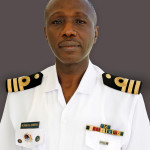
As Africa enjoys unprecedented economic growth, it is looking for ways to protect and expand this prosperity for years to come. During its 50th anniversary celebrations, African Union leaders pointed to the continent’s “blue economy,” the trade and industry linked to the sea, as vital to sustaining that growth in the coming decades.
“Africa being a big island, there is a need to have a better understanding of all activities in its adjoining oceans and seas, and think seriously how to maximize the limitless opportunities laying therein,” said Erastus Mwencha, deputy chairman of the African Union Commission.
Protecting the blue economy will require strong rule of law, which is why the Centre for Maritime Law and Security (CEMLAWS) Africa was created in 2015. CEMLAWS is headquartered in North Legon, Ghana, and its goal is to be a regional center of excellence that helps Gulf of Guinea countries update their laws and policies relating to maritime security so crimes such as piracy and illegal fishing can be prosecuted.
“What we are looking at is trying to promote effective responses to ocean governance challenges,” said Cmdr. Kamal-Deen Ali, legal director of the Ghana Navy and executive director of CEMLAWS. “We’re looking at capacity building, we’re looking at policy analysis and we’re looking at sustained research.”
CEMLAWS is focusing on helping nations seeking to implement the African Union’s Africa Integrated Maritime Strategy 2050, a continentwide policy adopted in 2013, and the Yaoundé Code of Conduct, adopted the same year by more than 20 West African and Central African countries.
Ali said CEMLAWS has assembled a global network of maritime security experts, industry professionals and others, including Professor Martin Tsamenyi of the Australian National Centre for Ocean Resources and Security, who serves as chair of the center, and Professor James Kraska of the Stockton Center of U.S. Naval War College, who serves as co-chair.
The center offers courses for navy officers, government officials and civilians on a wide spectrum of issues including law of the sea, maritime regulation and enforcement, maritime policing, rule of law, and sustainable fisheries.
“These courses will help fix the gaps that we have now in terms of capacity in the Gulf of Guinea space,” Kamal-Deen said.

